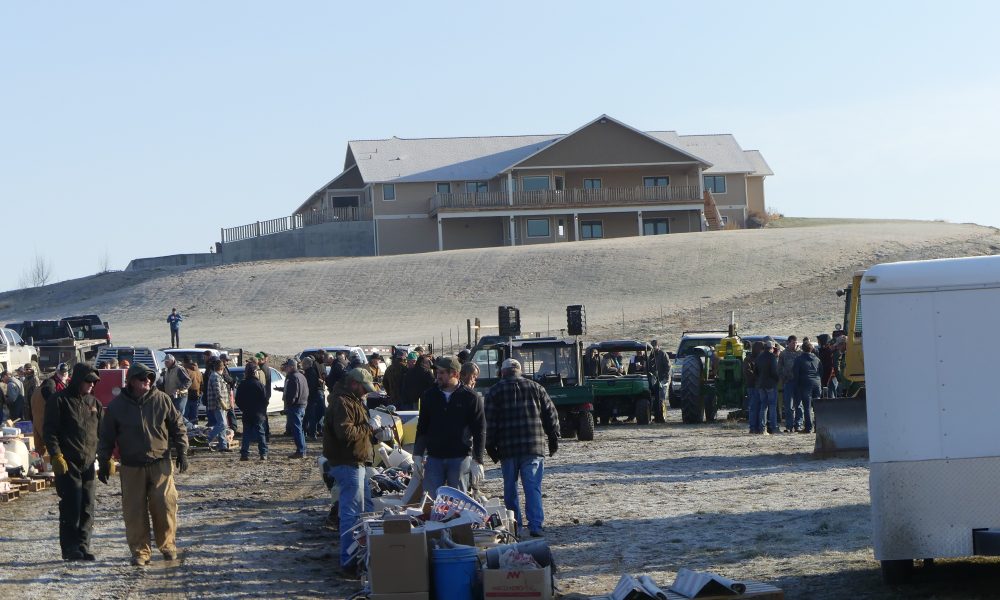
By Les Zaitz
The Enterprise
VALE – Galen Jantz, the failed Vale farmer, turned over everything he owned to settle millions in debts and hoped for only one thing – enough money to care for his now destitute family.
His financier, according to a new legal filing, wouldn’t provide it.
Jantz’s world collapsed earlier this year when his Nyssa grain brokerage, Farmers Grain LLC, went bankrupt under millions in debt and millions in losses. The financier of that operation then came calling for money owed by Jantz on his personal farming operations east of Vale.
Reports recently filed in court by his conservator provide the most detail to date on what crushed the brokerage. It also describes a debilitated Jantz, who now lives in a small rental in Wisconsin with no income and no assets.
The continuing effort to salvage something for creditors, ranging from banks to local farmers, moves back to the courtroom this Friday.
Attorneys will argue whether any of the money being collected from the sale of assets should go to Jantz. Last week, Jantz’s farming equipment at his Vale View Road operation was sold at auction, but details on how much was raised weren’t immediately available.
Steve Neighbors, appointed by the Malheur County Court to take control of Jantz’s assets and serve as his conservator, said in one report filed with the court that he examined Jantz’s financial records and those of Farmers Grain, talked with Jantz several times, and talked with others.
Neighbors described how Jantz sold his farm and nursery in Buhl, Idaho, and moved to the Vale area in 2009 to farm on land owned by a California man. He started buying his own farmland and in 2011 bought Nyssa property that was the start of Farmers Grain. The business bought and sold corn and wheat, provided grain storage for a fee, and rented farming equipment.
The image of a profitable operation shattered in 2016 when outside accountants started preparing financial summaries for Farmers Grain, Neighbors reported. He said the company lost $10 million in operations and was $25 million in debt, losing $7 million in hedging – futures sales contracts – and borrowing $8.3 million from Rabo AgriFinance and $4.3 million from Idaho farmer Chris Unruh.
Neighbors said in his report that Farmers Grain made a fatal mistake in how it arranged its grain buy-sell contracts. He said the company would agree in writing to a set price it would pay for grain. But the critical “sell” contract often wasn’t in place that would allow Farmers Grain to lock in a price to cover costs and post a profit.
“Many of the buyer’s commitments were verbal instead of written contracts,” Neighbors wrote. “When the market changed, buyers would then change what they would or could pay.” That meant Farmers Grain later had to sell grain at prices often below what it paid.
The trading, Neighbors concluded, “was purely speculative.”
He said “errant” inventory records compounded the trading flaw. He said Farmers Grain had a poor system for tracking delivery and storage of grain, particularly who owned the grain.
“One employee had control of that crucial data,” Neighbors wrote, without identifying the employee. “It was reported to me that the employee responsible for those spreadsheets would not let anyone into his password-protected spreadsheets.”
Neighbors said the inventory flaws meant Farmers Grain posted $5 million in profits it didn’t really have.
“This failure in inventory management gave rise to severely errant financial information over the past several years,” Neighbors wrote.
Farmers Grain subsequently filed for bankruptcy and is being liquidated. Separately, Rabo won a court order appointing a receiver to take control of Jantz assets pledged as collateral for loans.
Neighbors said in early August he talked to all the parties involved, proposing that $3,000 a month be allocated for Jantz, his wife and two children “to keep them off the street and get them stabilized.” He said no one, including Rabo’s representatives, objected to the plan.
He said in early October he traveled to Wisconsin to meet with Jantz. He found his family in a small rental home.
“The family is completely out of funds,” Neighbors said. “Someone slipped $1,400 into Galen’s wallet, most of which has now been consumed on food.”
He said Jantz is physically disabled and “struggles with crippling depression, especially in the mornings or when he thinks about the situation in which he put his family, friends, community, and church.”
Neighbors said that in early September, the court-appointed receiver told him there would be no money for Jantz.
“He cannot provide any emergency funds because Rabo will not consent,” Neighbors reported. He said the receiver “felt he had to deny even that budget within his authority due to Rabo’s refusal to allow the receiver the funds.”
In a note of his actions filed in court, Neighbors wrote that “Rabo not going to agree to 3k for Galen – believe he committed fraud.”
Rabo issued a statement to the Malheur Enterprise last week when asked for comment.
“This matter is in the hands of the receivership court and we are confident the receivership court will determine the proper distribution of the funds,” wrote Sarah Kolell, marketing vice president of Rabo AgriFinance. “Since this involves pending legal matters, we don’t believe additional dialog is appropriate.”
In his court filing, Neighbors said he was “dumbfounded” that Rabo rejected the request for money to cover “near-poverty level living expenses.”
In November, Neighbors filed in Malheur County Circuit Court for an order forcing release of some money. He said the court should order that rent owed Jantz personally by his two farming companies ought to be turned over “immediately” as well as money raised from the sale of some farming equipment.
Neighbors said in a November report that he advanced $6,276 “to cover what I deemed to be urgent costs for Galen and his family.”




